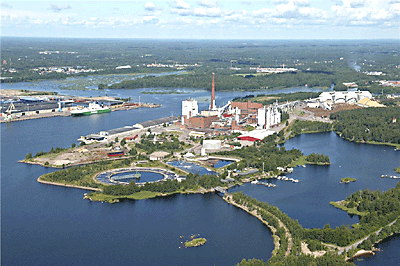Stora Enso to Install LignoBoost Plant for New Biorefinery at Sunila Mill
![]() Print this Article | Send to Colleague
Print this Article | Send to Colleague
 Stora Enso, Finland, will install a new Metso (Finland) LignoBoost lignin separation plant at its Sunila mill near Kotka in the southeast of Finland. The order is one part of Stora Enso’s EUR 32 million biorefinery project. Startup is scheduled for the first quarter of 2015. The value of the order was not disclosed.
Stora Enso, Finland, will install a new Metso (Finland) LignoBoost lignin separation plant at its Sunila mill near Kotka in the southeast of Finland. The order is one part of Stora Enso’s EUR 32 million biorefinery project. Startup is scheduled for the first quarter of 2015. The value of the order was not disclosed.
The LignoBoost plant is to be integrated with the pulp mill to separate and collect lignin from the black liquor. The new biorefinery will reduce the mill’s carbon dioxide emissions by replacing a significant amount of natural gas with dried lignin fired in the lime kilns. This is also the first step towards the creation of a new business to sell lignin to external customers.
"This investment is a significant step in the transformation of the Sunila mill towards an innovative and customer focused biorefinery. It will improve the mill’s environmental performance and enable Stora Enso Biomaterials Division to step into new markets with renewable solutions based on lignin," said Sakari Eloranta, SVP, Operations and Investment Projects, Stora Enso Biomaterials.
"LignoBoost is one of our biotechnology solutions that responds to the growing interest in utilizing bio-based raw materials. The technology was originally developed by Innventia and the Chalmers University of Technology. Metso acquired the technology in 2008 in its entirety and has developed it further. We are happy that we have been able to take this technology to commercial scale in our customer projects," Anders Larsson, director, Bio Materials, Metso, explained.
The order consists of a LignoBoost plant that will produce 50,000 metric tons of dried lignin per year. This will be the second commercial LignoBoost in the world. The first plant started up this year at the Domtar Plymouth mill in North Carolina, USA.
Stora Enso Biomaterials offers a variety of pulp grades to meet the demands of paper, board, and tissue producers. The mission is to develop higher value added bio-based products that contribute positively to our customers by helping them reduce their environmental footprint. The Sunila mill has an annual capacity of 370,000 metric tons of softwood pulp. The mill employs approximately 160 people.



